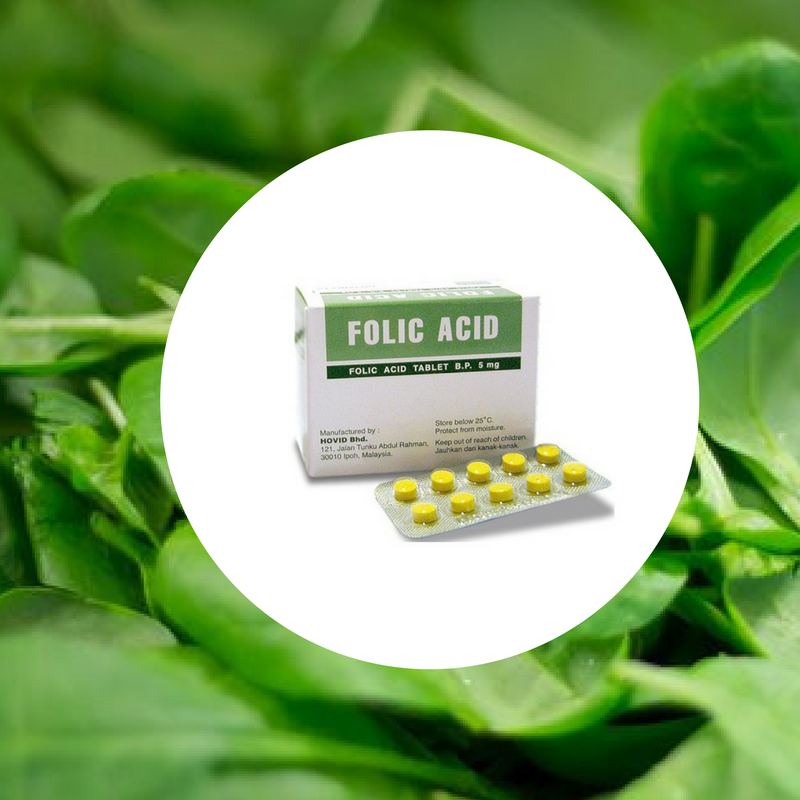Folate Vs. Folic Acid: Are They the Same Thing?

Unless you’ve been living under a rock, you’ve heard about the importance of getting folate/folic acid if you’re pregnant or trying to conceive.
A client got in touch with me recently asking for a recommendation for a prenatal vitamin that included folate instead of folic acid.
I really appreciated her for this on so many levels:
- She recognized that folate and folic acid aren’t inherently the same thing;
- On some level she understood that getting folate was “better” in some way;
- She wanted to get the best possible product to optimize her health; AND
- She had initiative to reach out for guidance.
All of these qualities are awesome on the fertility journey, or any journey to achieve optimal health.
The fact of the matter, however, is that folate cannot be found in a vitamin pill. If you find a vitamin pill whose packaging says it contains folate, it’s deceptive marketing.
What’s the Difference Between Folate and Folic Acid?
Once you understand the key difference between folate and folic acid, you’ll never need to ask the question again.
And the difference is simple.
Folate is a water-soluble B-vitamin – Vitamin B9 to be specific – that’s found naturally in foods. It’s absorbed by the body when we eat and once our body has absorbed what it needs, the rest is released through our urine.
Folic acid is a synthetic (i.e., made by a human or machine) form of Vitamin B9. It doesn’t occur naturally in foods, but can be found in fortified foods (foods where nutrients are artificially added) and supplements (pills or powders). Fortified foods that typically contain folic acid include flour (and by extension, breads, crackers, pizza crust, hamburger or hotdog buns, tortillas, cereals, pastas and so on), cornmeal (more tortillas and baked goods) and grains.
Due to its very nature, natural folate will never be found in a multi- or prenatal vitamin pill – but synthetic folic acid will.
Why is Vitamin B9 Important?
Folate serves a variety of purposes in the body. It helps to keep your cells functioning properly, as well as helping to form your red blood cells and DNA. It can also prevent anemia and heart disease. It keeps cholesterol levels down and reduces risk of stroke. In the world of fertility, it promotes sperm viability in men.
What you’ve probably heard most about in the fertility world is the role of folate in supporting normal fetal development and preventing birth defects, primarily neural tubal defects such as spina bifida and anencephaly. Many of these birth defects can form before you even know you’re pregnant, which is why experts recommend you watch your folate intake when you start trying to conceive.
It’s recommended that all women of childbearing age get 400 micrograms (mcg) of folate a day. For pregnant and trying-to-conceive women, that number jumps to 600 mcg.
Which Is Better for Us: Folate or Folic Acid?
While the term “folate” may be used interchangeably to describe both the natural vitamin and its synthetic form, you now know that this isn’t the case. This is more than a matter of semantics. It can have clear implications for our heath.
One is immensely healthy and the other can be deadly. Can you figure out which is which?
Hint: natural vs. synthetic
For this reason, I recommend you get Vitamin B9 through natural means as much as possible. This means folate, not folic acid. This also means making sure that we’re eating foods that are rich in this important vitamin.
Food is the best medicine that we have and the best way we can take control over our own health.
However, avoid foods fortified with folic acid as much as you can.
In the United States, folic acid fortification has been linked to cancer (including breast cancer, colorectal cancer and prostate cancer), as well as Austism Spectrum Disorder developmental issues. These linkages are still being studied, so the extent of them is not yet known, but to me the suggestion of such a linkage is enough to make me take notice and seek to eliminate these foods from my family’s diet as much as I can.
As far as supplementation, I strongly believe that if we’re eating a balanced diet with lots of whole fruits, vegetables and grains, healthy fats, and minimal processed grains and refined sugars, then we don’t need supplementation. And our bodies prefer food over supplements anyway.
And in the case of a water-soluble vitamin like folate, our bodies naturally self-regulate and eliminate what we don’t need, so it’s impossible to get too much and so the supplements are often a waste. Good food sources for getting folate are listed below.
Sometimes, though, it is difficult to get some nutrients through food (a great example is Vitamin D), or our bodies may have trouble absorbing them, and supplementation can be a good idea. And in the case of pregnant or trying-to-conceive women, we need more of folate than we normally would. In these limited cases, supplementation can be a good idea. Look for a whole-foods based, natural, organic supplement.
Good Folate Food Sources
- For getting folate, beans are our friends! Just 1 cup of beans go a long way toward getting our daily recommended allowance of folate: black-eyes peas (89%), chick peas (71%), pinto beans (74%), white beans like Navy beans (64%) or black beans (64%) are all excellent choices. Cooked lentils are also a powerhouse, as 1 cup gives 89% of the folate most of us need for the day.
- Leafy Green Vegetables. No doubt about it: green plant foods are among the richest sources of folate. Notice how the very word folate sounds amazingly similar to foliage? This isn’t a coincidence, and the benefits of these foods cannot be overstated. Spinach is the big winner here, with a cup of raw or lightly steamed spinach giving you 65% of your recommended daily allowance of folate, but kale, collard greens and even broccoli are also good choices.
- A half a cup of cooked asparagus gives us about 35% of the daily recommended value of folate, so this makes an excellent choice for your dinner side dish.
- One of my favorites! Avocados’ richness in folate is a benefit to an already long list of the nutritional benefits of this amazing fruit (along with healthy fats, fiber and potassium). Eating just half an avocado gives you about 20% of the recommended folate intake for a day – although they’re so delicious that I can’t stop at half and always eat a whole one!
- Nuts and seeds. Reach for these when you want a snack, as they’ll significantly bolster your folate intake for the day. A cup of sunflower seeds (21%), almonds (14%) or ground flax seed (14%) are all great choices. In addition to being a snack, you can add nuts and seeds to your salads or flax seed to soups and smoothies for an added boost.



